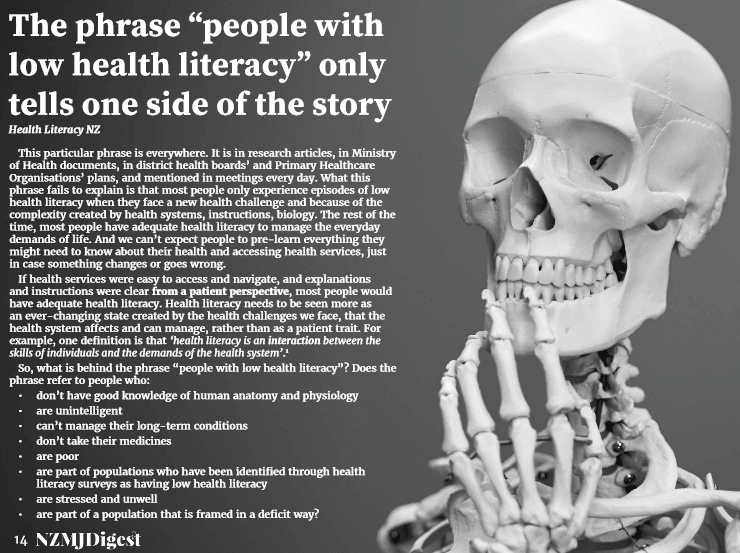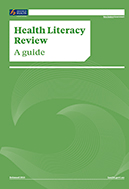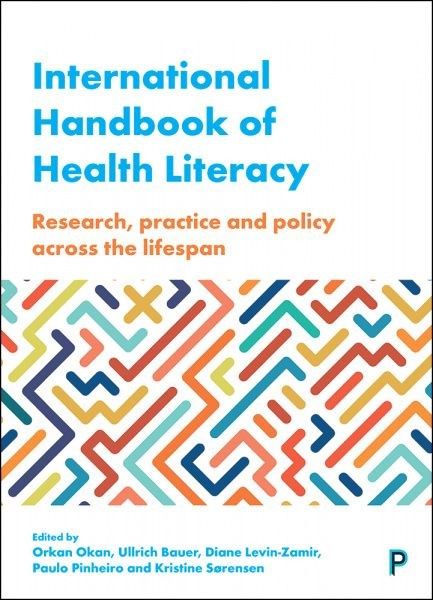Health literacy in Aotearoa New Zealand
Here is a recent article written for New Zealand Medical Student Journal explaining health literacy and what those working in health can do to provide health literacy services and care Health literacy in Aotearoa New Zealand – what every medical student needs to do | Published in New Zealand Medical Student Journal (scholasticahq.com)
What is health literacy?
A similar concept is conveyed by the Institute of Medicine (2004) where health literacy is described as the interaction between the skills and knowledge of individuals and the demands of the health system (Institute of Medicine 2004). Because of the way health systems and services are designed and delivered, consumers face a series of demands on their health literacy. These demands impact on consumers' ability to access health information, care and services. In many health settings there is a significant mismatch between the skills and knowledge consumers need in order to meet the health literacy demands imposed by the health system, and consumers' actual health literacy skills and knowledge.
Why is health literacy important?
Changes in the health system, such as the shift to patient-centred and shared care, and the recognition that the current health system is not financially sustainable, have put more emphasis on the need for consumers and their families to be responsible for their own health. For this to happen, consumers' health literacy knowledge and skills will need to be built so that consumers are not as reliant on the providers and health professionals to access to information and resources.
The focus on health literacy needs to extend far beyond improving the written materials given to consumers and their families. Health literacy involves changing the health care environment and how knowledge is shared.
A health literacy framework
What is a health literate organisation?
Health literacy review - a guide
The Guide describes the characteristics of a health literate organisation and uses a system-wide approach to review health services, taking into account:
- strategic direction and leadership support
- service and process design
- communication mechanisms
- workforce capability
- access to support and services,
- the experiences of consumers and families.
To develop the Guide we worked with three District Health Boards to trial and amend the health literacy review process in different contexts. We produced supporting material, such as the videos and observation tools, which accompany the Guide and can be found on the Ministry's website. Each review looked at how services and care were planned, structured and delivered as well as how consumers, whānau and families experienced these services.
More information on the Guide is available at
http://www.health.govt.nz/our-work/health-literacy...
NZMJ Digest
Here is an article we wrote for the New Zealand Medical Association, describing how health literacy needs to be seen as an ever-changing state created by the health challenges we face and the complexity of the health system, rather than as a patient trait. The phrase “people with low health literacy” only tells one side of the story, published in the February 2020 edition of the NZMJ Digest
https://digest.nzma.org.nz/nzmj-digest/nzmj-digest-issue-92/flipbook/14/

International Handbook of Health Literacy 2019
We were honoured to be asked to contribute a chapter about the history of health literacy in New Zealand to the International Handbook of Health Literacy - Research, Practice and Policy across the Life-Span edited by Orkan Okan, Ullrich Bauer, Diane Levin-Zamir, Paulo Pinheiro and Kristine Sørensen (2019). Here is our chapter, Health literacy in New Zealand: A tale of serendipity and indigenous health, as well as the link to the handbook. https://policy.bristoluniversitypress.co.uk/international-handbook-of-health-literacy
Research and brief history of health literacy
Over the years other models of health literacy were developed (Nutbeam, 2001 PPT presentation) which takes the view that the health sector needs to reduce the health literacy demands of its systems as well as develop the health literacy skills of individuals.
The "asset" model was endorsed in the 2004 publication "Health Literacy: A Prescription to End Confusion" by the highly regarded Institute of Medicine.

